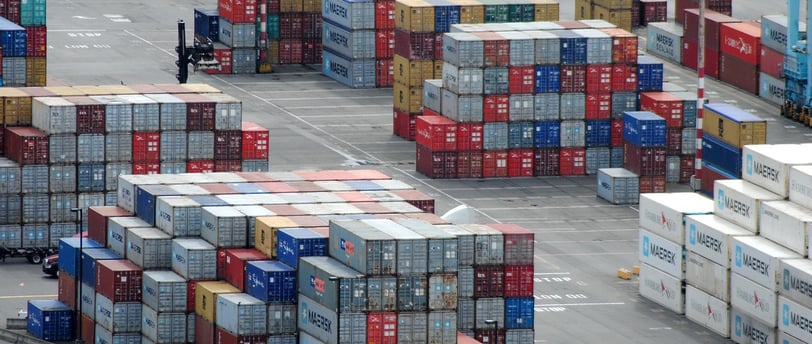Windway Logistics | Logistics and Transportation Solutions
How to Avoid Common Shipping Mistakes in Global Logistics
Avoid common shipping mistakes with this guide to best practices in global logistics.
9/20/20245 min read


Introduction
In the high-speed environment of worldwide logistics, even minor errors in shipping can cause significant delays, higher costs, and unhappy customers. As companies grow their operations across different countries, it becomes increasingly important to avoid mistakes in global shipping to ensure everything runs smoothly and efficiently. By following shipping best practices and being vigilant about potential problems, businesses can minimize errors in logistics and enhance their supply chain performance.
Here are some of the most common mistakes in global shipping and how to prevent them.
1. Missing or Inaccurate Documentation
Errors in documentation are a major cause of delays and disruptions in global shipping. When exporting products internationally, it's crucial to ensure all required paperwork is complete and accurate. Not having the right documents can result in delays in customs clearance, fines, or even the rejection of shipments.
How to Prevent Documentation Mistakes:
- Review documents carefully: Always check that all documents, including commercial invoices, bills of lading, certificates of origin, and packing lists, are filled out correctly and in full.
- Employ customs brokers: Hiring customs brokers can ensure that your documentation meets the import/export regulations of each country.
- Utilize logistics software: Use logistics software to automate and verify documentation, which can help reduce the chance of human error.
2. Improper Packaging
Improper packaging can lead to damaged items, extra shipping fees, or delays at customs. Mistakes in packaging include using the wrong materials, not securing items properly, or not adhering to the packaging standards of the destination country.
Best Practices for Proper Packaging:
- Choose suitable materials: Select packaging materials that are durable and appropriate for long-distance transport and handling.
- Label clearly: Ensure that your packages are labeled with all necessary information, including the destination address, handling instructions, and barcodes for tracking.
- Meet the destination country's packaging standards: Research and comply with any packaging requirements specific to the country you're shipping to avoid delays at customs.
3. Neglecting Tariffs and Duties
Tariffs, duties, and taxes can significantly affect your shipping expenses if not correctly accounted for. Not considering these costs can lead to unexpected charges, increasing the overall expense of your shipments.
How to Avoid Expensive Tariff Mistakes:
- Research tariffs and duties: Before shipping internationally, look into the applicable tariffs, taxes, and duties in the country you're shipping to.
- Classify goods accurately: Ensure that your products are classified correctly using the Harmonized System (HS) codes to prevent incorrect duty assessments.
- Work with a freight forwarder: Partner with freight forwarders who are knowledgeable about international regulations and can assist you in navigating tariff and duty requirements.
4. Neglecting Shipping Expenses
A prevalent mistake in international shipping is not accurately estimating the total expenses involved. Companies frequently underestimate the costs by overlooking extra charges such as fuel surcharges, handling fees, or taxes. This oversight can result in exceeding the budget and negatively affect the company's profit margins.
Strategies to Avoid Unexpected Shipping Expenses:
- Request detailed quotes: Always seek comprehensive quotes from shipping providers, including any potential extra fees or surcharges.
- Keep an eye on fuel prices: Monitor any fluctuations in fuel costs that could impact the overall shipping expenses.
- Consider all aspects: Take into account expenses like insurance, customs duties, and charges for port handling when calculating the shipping costs.
5. Disregarding Customs Laws
Each country has its own customs laws, and ignoring these can lead to significant hold-ups, fines, or even the confiscation of goods. It's essential to understand and adhere to the customs regulations of the countries you're shipping to avoid these common shipping mistakes.
Strategies for Adhering to Customs Laws:
- Familiarize yourself with destination-specific requirements: Make sure you're well-versed in the specific import/export rules of the countries you're shipping to.
- Accurately classify your products: Misclassifying your items can cause delays and penalties. Ensure your products are correctly classified according to international trade standards.
- Stay informed about regulatory changes: Customs laws are subject to frequent updates, so it's crucial to stay abreast of any changes that could affect your shipments.
6. Choosing an Inappropriate Carrier
Selecting an unsuitable carrier for your global shipments can lead to delays, damaged goods, or unexpectedly high costs. Not all carriers are equipped to handle international shipping, and some might lack the infrastructure necessary for certain routes or products.
Best Practices for Choosing the Right Carrier:
- Assess carrier expertise: Opt for a carrier with a solid reputation in international shipping and experience with your specific shipping routes.
- Compare rates and services: Don't just choose the carrier with the lowest price. Compare rates and services across various carriers to find the best match for your needs.
- Verify carrier reliability: Research the carrier's reliability, especially in terms of delivery times and the handling of goods.
7. Inadequate Communication and Lack of Tracking
Effective communication and real-time tracking are vital for ensuring that shipments remain on schedule and any issues are addressed swiftly. Failing to communicate with your logistics partners or provide customers with tracking information can result in unnecessary delays and unhappy clients.
Ways to Enhance Communication and Tracking:
- Implement logistics tracking software: Adopt technology that offers real-time tracking for both your team and your customers.
- Maintain open communication with partners: Keep open channels of communication with freight forwarders, carriers, and other logistics partners to tackle any issues that may arise during transit.
- Offer proactive updates to customers: Keep your customers informed about the progress of their shipments to foster trust and improve satisfaction.
8. Skipping on Cargo Insurance
During international shipping, accidents, theft, or damage can occur. Not having insurance for valuable shipments is a frequent oversight that can lead to significant financial setbacks.
Why Cargo Insurance Matters:
- Shield against financial loss: Cargo insurance protects the value of your items in the event they are damaged or lost while being transported.
- Lower financial exposure: Having insurance for high-value items lessens the financial exposure that comes with shipping and offers a sense of security.
- Assess the need for extra coverage: Determine the value of each shipment and decide if you need additional protection beyond what the carrier's basic liability covers.
9. Miscalculating Delivery Dates
Miscalculating delivery dates can result in missed deadlines, unhappy customers, and lost revenue. Many businesses overlook potential hold-ups at customs, adverse weather conditions, or congested ports.
Strategies to Prevent Delivery Date Mistakes:
- Account for potential delays: Consider possible delays when planning delivery times, particularly when shipping to distant or high-risk locations.
- Be transparent about delivery times: Set realistic expectations with your customers by providing them with precise delivery estimates.
- Keep an eye on shipments: Utilize tracking technology to monitor shipments in real-time and make adjustments to your plans if delays arise.
10. Ignoring Environmental Impact
In today's world, sustainability is a key concern in international logistics. Not taking into account eco-friendly shipping options or selecting carriers with a high carbon footprint can damage your brand's image and lead to increased costs over time.
Adopting Sustainable Shipping Practices:
- Choose environmentally friendly packaging: Select materials that are sustainable and recyclable for your packaging needs.
- Partner with eco-conscious carriers: Work with carriers that are dedicated to minimizing their environmental footprint through fuel-efficient operations or carbon offset initiatives.
- Merge shipments whenever possible: Reduce your environmental footprint by combining shipments to minimize the number of trips needed.
Conclusion
Preventing common mistakes in global shipping is crucial for keeping logistics operations efficient and cost-effective. By being proactive and implementing best practices such as thorough documentation, adherence to customs regulations, accurate cost projections, and enhanced communication, your business can minimize errors and provide a smooth experience for your customers. In today's complex global marketplace, investing in the right strategies is key to avoiding shipping issues and staying ahead of the competition.
Your One-Stop Shop for Logistics Solutions.
Contact
Follow
Support@windwaycentralogistics.com
+2347069986074
© 2024. All rights reserved.
+2347042141892
+233540806857
* Badagry expressway, Alafia Bus stop, behind Oando filling station( Bencord Warehouse),Lagos, Nigeria.
* Atiku Abubakar Hall, Balogun Trade Fair market, Lagos, Nigeria
* Abossey-Okai Mortuary Road, Opposite the Central Mosque, Ghana.


